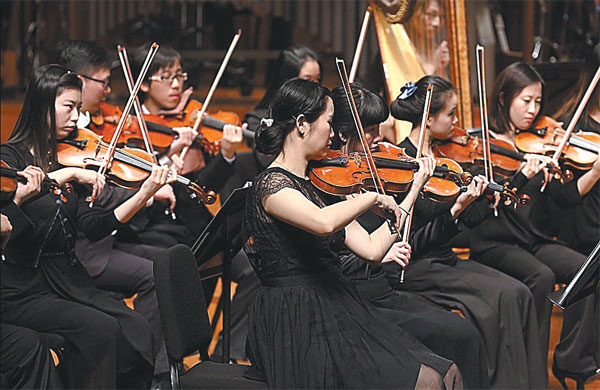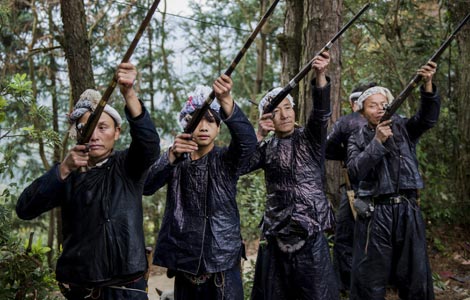The youth sounds out
Updated: 2013-12-20 07:39
By Chen Jie (China Daily)
|
||||||||
A competition staged by the national theater gives young composers a chance to shine on the world stage, Chen Jie reports.
Xiao Ying was living a dream, standing in front of a full-house at the National Center for the Performing Arts.
"I've imagined standing on this stage so many times. Last year's failure did not let me down. I did not give up. Instead, I kept composing. I love art and music," said Xiao, 26, when he won the National Center for the Performing Arts Young Composer Program on Dec 16.
|
Prize-winning works of the National Center for the Performing Arts Young Composer Program are played at the celebrated venue, an effort to promote China's new classical-style music. Photos Provided to China Daily |
That evening, 10 jury members listened to six final works played by the NCPA orchestra under the baton of conductor Zhang Yi. Xiao earned the highest score with The Cloud on the Wishful Side, a piece combining atonality, pan-tonality and tonality that also features pipa, a Chinese traditional plucked instrument.
As Xiao thanked the NCPA for giving young composers the opportunity to be heard, the jury head Chen Qigang stood at his side.
"As a composer myself I know how difficult it is to write every score," Chen says. "The result is not important now. They all did a great job and we like every piece. The point is their music can be performed and heard here."
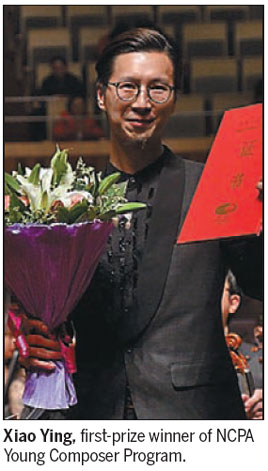
It was Chen who proposed launching the competition in September 2010. The music director of the 2008 Beijing Olympic Games and the last student of Olivier Messiaen (1908-92) believes composing is important to music's development in China, noting that the country has many world-class soloists and conductors but lacks contemporary composers and great works.
"Young composers need support. They need to be known, and their works need to be heard. That's why we arrange professional orchestras to perform these works in formal concerts and we record the works and introduce them to conductors, orchestras and music festivals," Chen says.
Chen Zuohuang, NCPA's music director and chief conductor of the NCPA orchestra, agrees: "Symphonic music needs good conductors, soloists and audience, but the foundation is the composer."
Chen Zuohuang says: "From Bach to Mozart to Beethoven, every generation of great composers received tremendous support from all walks of society. Today's composers badly need support, too. NCPA has the ability and has also realized the responsibility to do the job."
The conductor says that when the NCPA orchestra rehearsed, the musicians freely discussed the new works they were playing. Some nodded with enthusiasm while some scoffed that a piece was "bullshit".
"No matter whether comments are good or bad, the critical attention is all support. Please don't assume these works will be classics one day. The real judge is the audience and time."
In the first competition, seven jurors selected eight works from 74. The ultimate winner Du Wei's work was performed by the Philadelphia Orchestra and MDR Sinfonieorchester Leipzig. While Xiao says he failed last year, his Flowers Deep Hidden actually made it to the final round.
For this second edition of the competition, organizers started to accept entries in April 2012 and received 61 works by composers younger than 40. After a pre-selection, 24 scores were sent to 10 judges. Then 12 of the 24 were played at formal concerts by the NCPA orchestra and the Beijing Symphony Orchestra. The NCPA also recorded the 12 works and sent them to the jury.
The jury includes composers, conductors and soloists, because Chen Qigang believes each has different views toward a work. Plus, conductors and soloists could do more to promote new works.
To increase the program's international impact and create a worldwide stage for the young composers, the NCPA invited Radio France, Vale of Glamorgan Festival in Wales and MDR Sinfonieorchester Leipzig to join this year's program.
John Metchlf, artistic director of the Vale of Glamorgan Festival, says his event has particular interest in presenting living composers from ancient countries with new energy - like China. He voted for Xiao and will bring his work to the festival in May.
To ensure fair play, the 10 judges did not meet before the final concert on Dec 16.
"No discussions, no suggestions," Chen Qigang says. "We hope everyone will vote from his own heart and not expect to agree with each other. One asked me, if two works got the same score, whether I could decide the winner. I said no. We would vote again."
"Which to choose? It's really difficult," says Paul Meyer, the French clarinetist who served on the jury for the second time. "I try to be open-minded to feel what the score means to me."
French composer Philippe Schoeller, who came to China for the first time to be a juror, says he was impressed by the musical language and the fresh messages in the scores.
"It's not exactly a competition, which is for sports. The program is a way for the young composers to learn, to share knowledge and experience," Schoeller says.
Conductor Kristjan Jarvi shares that view, saying the program is "a bit of encouragement for the young composers and an inspirational example to follow".
"In such a hard time for classical music, it's difficult or impossible for young, unknown composers to find orchestras to play their works," he says.
Judge Tan Lihua, conductor of Beijing Symphony Orchestra, was pleased that he and his musicians played three concerts to present the applicants' works. "A musician's career always starts from being discovered, supported and promoted. When I was young, I received support from many established musicians. Now it's my duty and responsibility to help support others," Tan says.
Judge Xu Shuya, composer and president of the Shanghai Conservatory of Music, says the young composers' scores are full of passion and remind him of his youth studying in France.
"To me, styles and techniques are not the criteria. I would see the message they try to convey, the creativity and whether the work would inspire the future," Xu says.

Joel Bons, founder and artistic director of the Nieuw Ensemble, says the six final works have a wide variety in styles and musical languages.
Bons traveled through China in 1988 and became acquainted with a new generation of Chinese composers, including Xu and another jury member, Guo Wenjing.
He has been intrigued by the way Chinese composers are fascinated by the relationship between music and nature, and how they narrate stories through music. "Today's young composers inherit the tradition," he says. "In their music, people can hear insects, seasons, wind and rivers."
Contact the writer at chenjie@chinadaily.com.cn.
(China Daily 12/20/2013 page19)
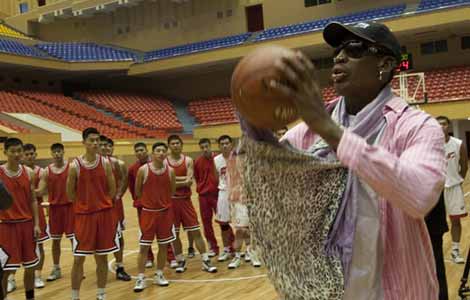
 Rodman trains basketball palyers in DPRK
Rodman trains basketball palyers in DPRK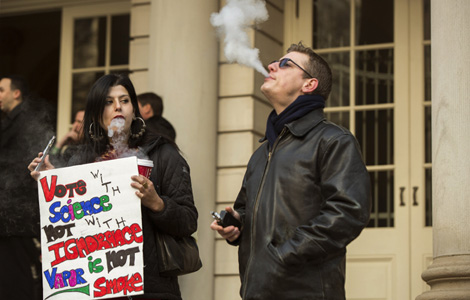
 New York mulls banning e-cigarettes
New York mulls banning e-cigarettes
 Climbers soar to new heights
Climbers soar to new heights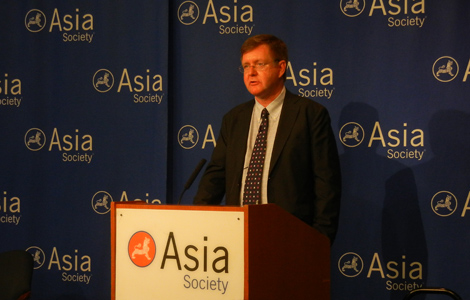
 Reading China's future through its past
Reading China's future through its past
 Yanukovich offers Ukraine protesters nothing
Yanukovich offers Ukraine protesters nothing
 Former NBA player may coach in DPRK
Former NBA player may coach in DPRK
 AVIC unveils plan for next-generation regional aircraft
AVIC unveils plan for next-generation regional aircraft
 Misses International shine in Tokyo
Misses International shine in Tokyo
Most Viewed
Editor's Picks

|

|

|

|

|

|
Today's Top News
China rejects US GM corn shipment
China, US start annual trade talks
New York mulls banning e-cigarettes
Verizon plans more data-request disclosures
88 injured in London theater collapse
'Deportation relief' important to Asian Americans
Reading China's future through its past
New US ambassador 'must find right mix'
US Weekly

|

|
